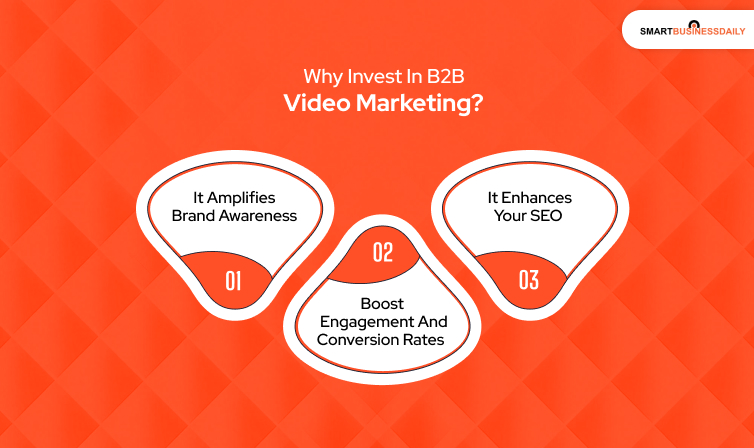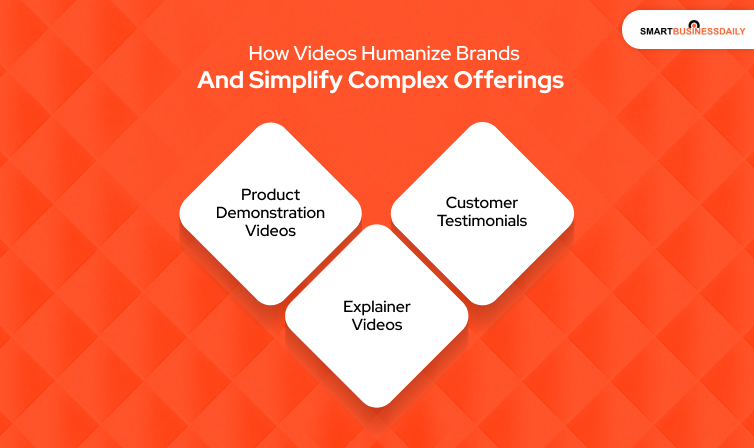Why B2B Brands Are Turning to Video Marketing To Boost B2B Sales?
6 Mins Read
Published on: 10 May 2025
Last Updated on: 20 May 2025

- The Challenges of Credibility in B2B Sales Cycles
- Why Invest In B2B Video Marketing?
- 1. It Amplifies Brand Awareness
- 2. Boosts Engagement And Conversion Rates
- 3. It Enhances Your SEO
- How Videos Humanize Brands and Simplify Complex Offerings
- Product Demonstration Videos
- Explainer Videos
- Customer Testimonials
- Supporting Every Stage of the Buyer Journey with Video
- The Importance of Secure Video Sharing
- Practical Tips for Creating Video Content on a Budget
- Conclusion
Regarding business-to-business (B2B) marketing, clients often seek trustworthiness and credibility. Yet, this isn’t easy to prove.
The longer and more complex the sales cycle, the harder it is for brands to work to convince skeptical clients that they are the right partner for the job.
Fortunately, one approach will help cut through all the uncertainty: video content. It’s not just a visual medium—it’s an indispensable trust-building tool.
This article will discuss the benefits of using B2B video marketing to cultivate authentic trust with potential clients and business partners in the B2B sector.
The Challenges of Credibility in B2B Sales Cycles

B2B sales cycles are completely different from those in the B2C space. Deals often require months to finalize because multiple stakeholders need to approve decisions.
Furthermore, these agreements frequently involve technical details and clarification that some clients might find challenging to understand.
Whitepapers and email marketing excel at conveying information, yet they frequently fail to inject the emotional depth and persuasive power crucial for driving action.
While they present the facts, their delivery can be perceived as sterile and lacking the human element necessary for true influence.
Moreover, in the world of B2B, clients want proof of authenticity, in-depth industry knowledge, and unyielding reliability before making any commitments.
Opportunities can be easily lost if these traits aren’t swiftly established.
Why Invest In B2B Video Marketing?

Investing in B2B video marketing is one of the most lucrative options available right now. Nevertheless, I’ve got you if you need further reasons to do the same.
The data shows an immense impact of video marketing on B2B sales. According to HubSpot State of Marketing, 2025,13.99% of marketers plan to increase their investment in video marketing channels in 2025.
Moreover, 96% of marketers agree that videos have helped increase users’ understanding of their product or service.
Wyzowl asserts that 89% of businesses will continue to cater to video marketing. Additionally, 68% of marketers, who haven’t adhered to it yet, plan to do so in 2025.
1. It Amplifies Brand Awareness
Video grabs attention and quickly engages viewers. This helps you reach a larger audience than other types of content, which is great for building brand awareness.
Oh, but did you know? The good thing about focusing on brand awareness is that it doesn’t need to lead to sales.
It simply needs to show who you are in a way that people remember. Video is an excellent way to do this.
According to Hubspot, 40% of marketers say the main benefit of creating video content is helping customers understand their products and services.
2. Boosts Engagement And Conversion Rates
Which would you prefer: the Clue video mentioned or an educational article about perimenopause?
If you’re experiencing symptoms, you’ll likely find the article more useful. However, videos are better for a quick share.
B2B video marketing thus proves to be extremely beneficial, as an engaged audience spends more time on your site and is more likely to buy.
Why? Videos explain your product clearly and address questions upfront, helping people make informed and confident purchasing decisions.
According to Plainly data, in 2025, around 51% of consumers will rely on product videos to make an educated purchase decision.
3. It Enhances Your SEO
Search engines favor video content. Websites that use videos are more likely to appear on the first page of search results.
B2B video marketing can improve your site’s SEO in several ways. They increase the average time visitors spend on your site, which helps your search rankings.
Secondly, using the right tags, descriptions, and transcripts can enhance your SEO efforts and support your presence on multiple platforms.
Moreover, including videos in your blog posts offers visitors the choice to read, watch, or do both, while also improving your organic ranking.
This greater visibility can lead to more organic traffic to your site.
How Videos Humanize Brands and Simplify Complex Offerings

We have already mentioned that videos can be a great form of content to make a B2B brand feel more relatable or human.
Yet, how exactly is this achieved? What type of videos are best suited for this?
Product Demonstration Videos
This type of video content mainly addresses functionality and reliability in a quick and informative, yet easy-to-digest manner.
The goal is to show real-world use by real people in relatable scenarios. Also, it helps paint a picture that your product solves a problem that is considered a realistic pain point.
Explainer Videos
This type of video offers clear human understanding. Its goal is to clarify intricate concepts or functionalities and turn them into engaging narratives.
Remember the technicalities that some clients find hard to grasp? This type of video solves that perfectly
Customer Testimonials
Peer validation is a powerful and persuasive force that can significantly influence people’s decisions.
Showing real client success stories is a surefire way to boost credibility. This is also something that scales with your business, which means the more clients you help succeed, the more videos of this nature you can create.
Customer testimonial videos demand genuine effort and careful production, regardless of style.
While approaches may differ, authenticity must be the unwavering foundation of every video created.
Supporting Every Stage of the Buyer Journey with Video
Sure, videos can be a tool for showing sincerity and credibility, but what about their ability to align with the buyer’s journey? Yes, video content can fit this concept well, too.
In the awareness stage, brands can utilize introductory videos to grab clients’ attention and create lasting impressions. There are various ways to do this, with two common examples being success stories and thought leadership pieces.
Explainer videos and case studies shine the brightest during the consideration stage. At this point, clients are evaluating their options, so any video that enlightens the viewer helps ease them into the next stage.
Finally, the decision-making stage is where personalized video content helps seal deals. The goal here is to leave no room for second thoughts or reconsiderations. This is when testimonial and product deep dive videos act as the cherry on top of the deal cake.
The Importance of Secure Video Sharing
Since some B2B marketing videos contain sensitive information meant to be exclusive to your clients, securing your video-sharing methods is essential. Of course, the same goes for protecting your marketing tools.
Security tools deserve the same attention as your creative tools when working with valuable marketing content.
So, it’s natural that password managers seem like a practical necessity for marketing teams.
For Apple users on your team, Mac password vaults integrate naturally with the systems you’re already using.
Meanwhile, Windows users can benefit from similar built-in tools like Windows Credential Manager or third-party options that work seamlessly across platforms.
Moreover, virtual private networks (VPNs) are great for keeping data transfers safe from interception.
For example, suppose you are connected to an unsecured network during a business trip and need to transfer video files.
In that case, a VPN adds protection against any attempts to steal or redirect those files.
The best VPNs are often discussed on social platforms like Reddit or Quora. Before you choose one, first look at which VPN receives the most recommendations from other marketers, and then commit to one.
Practical Tips for Creating Video Content on a Budget

You might have some reservations about going all in on video production for marketing, which is understandable.
However, you don’t have to produce commercial-level videos from the get-go. You can start filming using smartphones and use low-cost editing software.
Once you’ve built up a collection of videos, consider repurposing some of them.
For example, short-form videos can be created using clips from longer videos, and existing infographics can be incorporated into explainer videos.
If you want authentic testimonial videos, user-generated content is the way to go.
Content from actual users just feels way more believable. Once your team gets the hang of the video production process, you can level up your production quality to attract more clients. So draft a script, pick up that camera, and hit record.
Conclusion
If your business hasn’t used video content to drive B2B sales before, it might seem like a challenging task.
However, by following the steps we’ve discussed here, your video efforts will yield meaningful results.
Trust your marketing team’s expertise and remain open to feedback from your clients to improve your approach continuously.



















Comments Are Closed For This Article